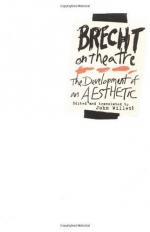
|
| Name: _________________________ | Period: ___________________ |
This test consists of 15 multiple choice questions and 5 short answer questions.
Multiple Choice Questions
1. When asked who Brecht wrote for in "Conversations with Bert Brecht", he said that he wrote for people who wanted to have fun and didn't hesitate to keep their _____ on in the theatre.
(a) Glasses.
(b) Hats.
(c) Boots.
(d) Coats.
2. Which work by Goethe was better as a book than a theatrical production, according to Brecht?
(a) Der Zauberlehrling.
(b) Der Erlkönig.
(c) Faust.
(d) Iphigenie auf Tauris.
3. The goal of epic theatre is less to moralize than to _____.
(a) Elicit.
(b) Contradict.
(c) Eviscerate.
(d) Observe.
4. In reference to film, Brecht felt that the mechanization of literary production cannot be _____.
(a) Anticipated.
(b) Thrown off a cliff.
(c) Thrown into reverse.
(d) Detached.
5. How does Brecht categorize opera?
(a) As culinary.
(b) As holy.
(c) As holistic.
(d) As trashy.
6. Where dramatic theatre emphasizes plot, epic theatre emphasizes _____.
(a) Narrative.
(b) Consequence.
(c) Setting.
(d) Dialogue.
7. Who wrote Die Asthetschen Anschauungen Berthold Brechts?
(a) Helene Weigel.
(b) Werner Hecht.
(c) Helge Hultberg.
(d) Piscator.
8. What did Brecht win in 1922 for Trommeln in der Nacht?
(a) The Nobel Prize.
(b) A Tony Award.
(c) An Oscar.
(d) The Kleist Prize.
9. How does Brecht describe the flesh and bones resistance to formula in the Threepenny Opera?
(a) As Baconian materialism.
(b) As a diversion technique.
(c) As pure socialism.
(d) As trivial.
10. What does Brecht say put a stop to epic and didactic tendencies of theatre in Berlin?
(a) Fascism.
(b) Capitalism.
(c) Apathy.
(d) Communism.
11. Piscator's Theater am Nollendorfplatz was based on _____ principles.
(a) Aristotelian.
(b) Capitalist.
(c) Communist.
(d) Marxist.
12. Brecht states that knowledge is just _____.
(a) A vapor.
(b) A curse.
(c) A commodity.
(d) Propaganda.
13. Where did Brecht give an explanation of Ber Flug der Lindberghs in 1929?
(a) The Hague.
(b) The Kleist Prize ceremony.
(c) In London.
(d) The Baden-Baden music festival.
14. _____ is two volumes of collected plays published by Malik Verlag, London.
(a) Schriffen zum Theater.
(b) Theaterarbeit.
(c) Gesammelte Werke.
(d) Sonatas.
15. In what year did Brecht die?
(a) 1956.
(b) 1976.
(c) 1939.
(d) 1946.
Short Answer Questions
1. Where was the epic production of Mann ist Mann starring Peter Lorre performed?
2. Who does Brecht mention in association with London theatre when he talks about the theatre centers of the world?
3. How does Brecht say that the opera, the stage, and the press impose their views on the public?
4. What is the Marxist phrase for the whole body of art, ideas, and morality of any given society?
5. What does the word 'Spass' mean in German?
|
This section contains 383 words (approx. 2 pages at 300 words per page) |

|




